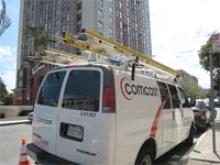It looks like Palo Alto should move quickly on expanding its publicly owned fiber-based I-NET - as the city renegotiates the cable franchise with Comcast, the private cable company is trying to rip-off taxpayers with exorbitant prices for community anchor tenants. California is one of several states to recently take negotiating power on cable television franchises away from communities and grant it to the state. Historically, communities negotiated a free or reduced rate for connectivity to schools, public safety buildings and other key community anchors in return for access to community Right-of-Way - an essential permission necessary to build a cable network. However, as these agreements come up for review, the regulatory landscape is significantly different than it was when they were negotiated in the past. Federal and state decisions have limited the power of communities to gain concessions from cable companies as they continue to raise prices and post large profits.
In response, many communities have embarked on smart efforts to build their own fiber-optic networks connecting key institutions. These networks often save money while greatly increasing available bandwidth, allowing local governments to be more efficient and use cutting-edge applications. In some communities, these Institutional Networks have formed the backbone of next-generation networks that extend full fiber-to-the-home network access to businesses and citizens. Palo Alto has not yet connected all the necessary buildings with its network and still depends on Comcast for bandwidth to those areas. Communities should beware - network ownership means power. The network owner can decide what price to charge schools - prices that must be paid with tax dollars. Communities building their own networks have slashed these prices and reduced pressure on the tax base. They don't have to worry as much when cable franchise negotiations are up again - like Palo Alto is now.



